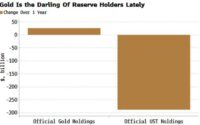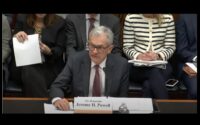Global Central Bankers Warn of Uncertainty Amid Rate Debate
(Bloomberg) — Central bankers from Australia, the UK and Thailand warned that the monetary policy outlook remains uncertain, despite growing global expectations that interest rates are at or close to their peak.
Most Read from Bloomberg
The Reserve Bank of Australia is grappling with “a wide range of uncertainties and experiences,” Governor Michele Bullock said at a monetary conference in Hong Kong. Economic activity has held up more than expected and services inflation is proving “a bit sticky,” she added.
Bank of England Deputy Governor Dave Ramsden noted that he’s becoming more confident about the outlook, though many uncertainties remain. Markets have internalized that rates will remain higher for longer, he said, while noting the volatility of the rates markets and its sensitivity to data releases.
Higher interest rates have boosted bank profitability, but the effect will be short term, said Bank of Spain Governor Pablo Hernandez de Cos. He warned that at some point credit risks may arise, and there may be losses in assets.
“We are sending the message that the banking sector should remain very prudent,” he said, suggesting banks should use their high profitability to increase their resilience.
Bank of Thailand Governor Sethaput Suthiwartnarueput expressed concern about the high level of household debt, which stands at about 90% of gross domestic product. Other factors complicating policy include that credit growth has turned negative for small and medium-sized businesses, and tourism from China has not returned to pre-pandemic levels.
In addition, Sethaput said Thailand and some other emerging markets may end up with lower rates than in the US, something that hasn’t been seen before.
“We’re in a pretty decent position to handle the volatility,” he said. “That said, I think it’s important not to be too sanguine.”
Hong Kong Financial Secretary Paul Chan gave the opening remarks at the conference organized by the Hong Kong Monetary Authority and the Bank for International Settlements.
The trend toward deglobalization and de-risking is a concern, Chan said, warning it would hinder economic growth, limit access to markets and impact supply chains. On the plus side, a full-blown decoupling seems less likely due to a recent easing in geopolitical tensions.
Still, the change is sizable enough to alter the face of the global economy — and the way future economic crises unfold, according to Philipp Hildebrand, vice chairman of BlackRock Inc. and former head of the Swiss National Bank.
Fragmented trade, along with aging populations and a move toward net zero means many countries will be facing significant supply-side constraints, Hildebrand said. “This means that we’re going to constantly bump up against sticky inflation, even when we get to 2%.”
Central banks should not be caught unaware by another inflation spike, the way many were post-pandemic, said Jacob Frenkel, ex-Bank of Israel governor.
“Are the shocks permanent or transitory is the wrong way to pose the question. The role of the central banker is to ensure those shocks that come to the system become temporary because of the actions the central bank will take,” Frenkel said. “If they becomes permanent, then it means that you failed.”
The coming years are going to be “much more difficult” than the previous ones, said Philip Lowe, who was governor of the RBA until mid-September this year and was Bullock’s predecessor.
“I think we’re going to see a lot more variability in inflation than we’ve had for the last 30 years,” he said, adding the world is now in the first instance of this more volatile price environment.
“This is why the current inflation test is so important, it’s so important we pass it,” said Lowe. “Central banks have to be able to convince people that inflation will return to target fairly soon. If they don’t, then the next time inflation moves away from target — and there will be plenty of examples — people won’t believe that it’ll come back and that’ll make” the job much harder.
Lowe said he hopes most central banks have done enough, but he worries that “they haven’t and it’s doubly important that we pass this first inflation test.”
–With assistance from Suttinee Yuvejwattana, Michael Heath and Claire Jiao.
(Updates with comments from former governors.)
Most Read from Bloomberg Businessweek
©2023 Bloomberg L.P.
[ad_2]
Source link


